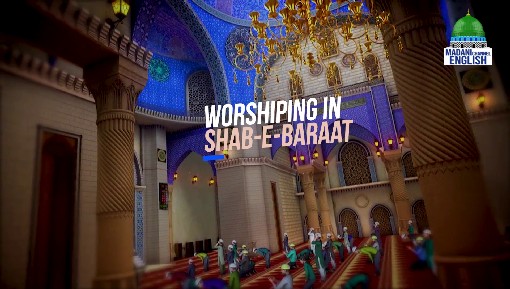
The Practice of the Righteous on Laylat al-Barāˈah (Mid-Shaʿbān)
Mawlana Rashid Ali Attari Madani
Shaʿbān is the eighth month of the Islamic calendar, particularly noted for the significance of its 15th night: Laylat al-Barāˈah (Mid-Shaʿbān). On this night, Allah’s mercy and blessings descend. Prayers are accepted on this night, so one should ask Allah Almighty for the best of this world and the Hereafter. This is evidenced by a hadith of Prophet Muhammad صَلَّى الـلّٰـهُ عَلَيْهِ وَاٰلِهٖ وَسَلَّم, in which he صَلَّى اللهُ عَلَيْهِ وَاٰلِهٖ وَسَلَّم explained duꜤā is not rejected on five nights, one of which is the 15th of Shaʿbān (otherwise known as Laylat al-Barāʾah or Mid-Shaʿbān).[1]
The virtues of this night are described in hadith and the statements of the Companions رَضِیَ اللهُ عَنْهُم and saints رَحِمَهُمُ الـلّٰـهُ. The Messenger of Allah صَلَّى الـلّٰـهُ عَلَيْهِ وَاٰلِهٖ وَسَلَّم and pious predecessors spent this night in worship and encouraged the same.
The night in which doors of goodness are opened
The Prophet صَلَّى الـلّٰـهُ عَلَيْهِ وَاٰلِهٖ وَسَلَّم mentioned the doors of goodness opening on four nights, one of which is the 15th of Shaʿbān. During it, the names of those who shall die, people’s sustenance, and those who shall perform hajj are written.[2]
The Prophet’s lengthy prostrations (sujūd)
During Laylat al-Barāʾah, the Messenger of Allah صَلَّى الـلّٰـهُ عَلَيْهِ وَاٰلِهٖ وَسَلَّم would prostrate for a lengthy period. Lady ꜤĀishah رَضِیَ الـلّٰـهُ عَنْها explains:
“One night, the Prophet صَلَّى الـلّٰـهُ عَلَيْهِ وَاٰلِهٖ وَسَلَّم stood to offer salah. He صَلَّى اللهُ عَلَيْهِ وَاٰلِهٖ وَسَلَّم prostrated for so long that I thought his soul had left his body. Seeing this, I stood, took hold of his thumb and moved it; his thumb then showed sign of movement.
I returned. Then, he صَلَّى اللهُ عَلَيْهِ وَاٰلِهٖ وَسَلَّم raised his blessed head from prostration and completed his salah. ‘O ꜤĀishah!’ he asked, ‘Did you presume that the Prophet would be disloyal to you?’ I replied, ‘O Messenger of Allah صَلَّى الـلّٰـهُ عَلَيْهِ وَاٰلِهٖ وَسَلَّم! By Allah, this is not the case! However, seeing your long prostration, I assumed your soul had left your body.’
He صَلَّى اللهُ عَلَيْهِ وَاٰلِهٖ وَسَلَّم asked, ‘Do you know what night this is?’ ‘Allah Almighty and His Messenger صَلَّى اللهُ عَلَيْهِ وَاٰلِهٖ وَسَلَّم know best’, I replied. ‘This is the night of mid-Shaʿbān. During it, Allah has mercy upon His servants. He forgives those who ask for forgiveness and has mercy upon those who seek it. He leaves the spiteful in the state they are in.’”[3]
Visiting graveyards on Laylat al-Barāˈah
On this night, the Prophet صَلَّى الـلّٰـهُ عَلَيْهِ وَاٰلِهٖ وَسَلَّم visited the graveyard and prayed to Allah Almighty for the people buried there.
Lady ꜤĀˈishah رَضِیَ الـلّٰـهُ عَنْها relates, “I found the Prophet صَلَّى الـلّٰـهُ عَلَيْهِ وَاٰلِهٖ وَسَلَّم in Jannat al-Baqīʿ on the 15th night of Shaʿbān praying for the forgiveness of Muslim men, women, and martyrs.”[4] We too should ensure to stay awake during this night of mercy and forgiveness, busying ourselves with prayer, dhikr, and duꜤāˈ. In addition to asking for our own forgiveness, we should visit graveyards and pray for the Muslims buried there.
Imam Ḥasan’s رَضِىَ اللهُ عَـنْهُ routine worship on 15th ShaꜤbān
Sayyidunā Ṭāˈūs Yamānī رَضِىَ الـلّٰـهُ عَـنْهُ narrates: “I inquired from Imam Ḥasan رَضِىَ الـلّٰـهُ عَـنْهُ regarding worshipping on the 15th night of Shaʿbān, to which he replied, ‘I divide the night into three parts: I recite ṣalāt upon my grandfather صَلَّى الـلّٰـهُ عَلَيْهِ وَاٰلِهٖ وَسَلَّم in one part, repent to Allah Almighty in another, and spend the final part acting upon Allah’s command by bowing and prostrating.’
‘What reward is there for someone who does this?’ I asked. He رَضِىَ اللهُ عَـنْهُ replied, ‘I heard from my father (ʿAlī b. Abī Ṭālib رَضِىَ الـلّٰـهُ عَـنْهُ) that the Prophet صَلَّى الـلّٰـهُ عَلَيْهِ وَاٰلِهٖ وَسَلَّم declared, “Whoever worships on the night of mid-Shaʿbān shall be written amongst the muqarrabīn.’”[5]
Preparing for this sacred night
On the 15th night of Shaʿbān, Sayyidunā Khālid b. Maʿdān, Luqmān b. ʿĀmir, and other pious predeccesors رَحِمَهُمُ الـلّٰـهُ would wear fine clothes, use perfume, apply kohl to their eyes, gather in the masjid and spend it worshipping Allah Almighty.
Endorsing this and the custom of gathering in masjids to offer voluntary (nafl) worship, Sayyidunā Isḥāq b. Rāhawayh رَحْمَةُ الـلّٰـهِ عَـلَيْه said, “This is not an innovation (bidʿah).” Sayyidunā Ḥarb al-Kirmānī رَحْمَةُ الـلّٰـهِ عَـلَيْه narrated this statement from him.[6]
The Practice of the people of Mecca
Abū ʿAbdullah Muhammad b. Isḥāq al-Makkī al-Fākihī رَحْمَةُ الـلّٰـهِ عَـلَيْه, who was a noble figure from the third century AH, said: “When it was Laylat al-Barāˈah, the people of Mecca would come to Masjid al-Ḥarām, offer salah, and circumambulate the KaꜤba. They remained engaged in worship and reciting the Quran until morning. Some of them would offer 100 units of voluntary salah whereby they recited Sūrah al-Ikhlāṣ 10 times after Sūrah al-Fātiḥah in each unit (rakʿah). They also drank Zamzam water, performed ghusl with it, and put some aside for those who were unwell. In this manner, they enjoyed the blessings of that night.”[7]
[1] Al-Jāmiʿ al-Ṣaghīr, p. 241, hadith 3,952, summarised; Ibn ʿAsākir, vol. 10, p. 408
[2] Al-Durr al-Manthūr, al-Dukhān, verses 1-5, vol. 7, p. 402
[3] Shuʿab al-Īmān, vol. 3, p. 382, hadith 3,835
[4] Shuʿab al-Īmān, vol. 3, p. 384, hadith 3,837
[5] Al-Qawl al-Badīʿ, p. 396
[6] Mā Dhā fi Shaʿbān, p. 75
[7] Akhbār Makkah li al-Fākihī, part 3, vol. 2, p. 84

















Comments